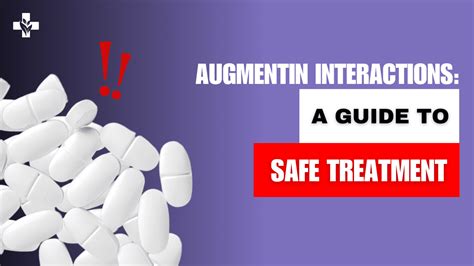Intro
Augmentin is a widely prescribed antibiotic medication used to treat a variety of bacterial infections, including pneumonia, sinusitis, and skin infections. While generally considered safe and effective, Augmentin can cause a range of side effects, some of which can be serious. In this article, we will explore the common side effects of Augmentin, what to expect, and when to worry.

Common Side Effects of Augmentin
Augmentin is a combination of two antibiotics, amoxicillin and clavulanate. The most common side effects of Augmentin are mild and temporary, and may include:
- Diarrhea
- Nausea and vomiting
- Abdominal pain
- Headache
- Fatigue
- Rash
These side effects are usually self-limiting and resolve on their own within a few days of stopping the medication. However, in some cases, they can be severe or persistent, and may require medical attention.
Less Common Side Effects of Augmentin
In addition to the common side effects, Augmentin can also cause less common but more serious side effects, including:
- Allergic reactions, such as hives, itching, and difficulty breathing
- Severe diarrhea or Clostridioides difficile (C. diff) infection
- Liver damage or elevated liver enzymes
- Kidney damage or decreased kidney function
- Blood disorders, such as anemia or low platelet count
- Neurological problems, such as seizures or tremors
If you experience any of these side effects, it is essential to seek medical attention immediately.

When to Worry About Augmentin Side Effects
While most side effects of Augmentin are mild and temporary, there are certain situations where you should seek medical attention immediately. These include:
- Severe allergic reactions, such as anaphylaxis
- Difficulty breathing or swallowing
- Severe abdominal pain or diarrhea
- Vomiting blood or black tarry stools
- Seizures or tremors
- Severe headache or confusion
- Fever or chills
If you experience any of these symptoms, call your doctor or seek emergency medical attention.
What to Do If You Experience Side Effects
If you experience side effects from Augmentin, there are several steps you can take to manage them:
- Diarrhea: Drink plenty of fluids and consider taking an anti-diarrheal medication.
- Nausea and vomiting: Take your medication with food and consider taking an anti-nausea medication.
- Headache: Take over-the-counter pain medication, such as acetaminophen or ibuprofen.
- Rash: Apply topical creams or ointments, such as hydrocortisone cream.
However, if your side effects are severe or persistent, it is essential to seek medical attention.

Reducing the Risk of Augmentin Side Effects
While side effects are a risk with any medication, there are several steps you can take to reduce the risk of side effects from Augmentin:
- Take your medication as directed: Take your medication exactly as prescribed by your doctor.
- Monitor your side effects: Keep track of any side effects you experience and report them to your doctor.
- Stay hydrated: Drink plenty of fluids to help prevent diarrhea and other side effects.
- Avoid certain medications: Certain medications, such as antacids and blood thinners, can interact with Augmentin and increase the risk of side effects.
By following these tips, you can reduce the risk of side effects from Augmentin and ensure a safe and effective treatment.

Conclusion
Augmentin is a widely prescribed antibiotic medication that can cause a range of side effects, some of which can be serious. While most side effects are mild and temporary, it is essential to be aware of the potential risks and take steps to manage them. By understanding the common side effects of Augmentin, what to expect, and when to worry, you can ensure a safe and effective treatment.

We hope this article has provided you with valuable information about Augmentin side effects. If you have any questions or concerns, please don't hesitate to comment below or share this article with others.
What are the common side effects of Augmentin?
+The common side effects of Augmentin include diarrhea, nausea and vomiting, abdominal pain, headache, fatigue, and rash.
What should I do if I experience side effects from Augmentin?
+If you experience side effects from Augmentin, you can try to manage them by drinking plenty of fluids, taking anti-diarrheal medication, and applying topical creams or ointments. However, if your side effects are severe or persistent, you should seek medical attention.
Can Augmentin cause allergic reactions?
+Yes, Augmentin can cause allergic reactions, including anaphylaxis. If you experience any symptoms of an allergic reaction, such as hives, itching, or difficulty breathing, you should seek medical attention immediately.
